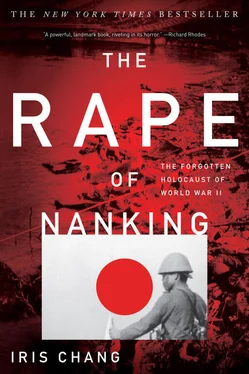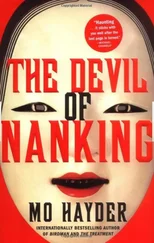There is another myth that the demands of being a working mother contributed to her mental illness. During the two years between our son’s birth and her breakdown, a full-time nanny cared for Christopher and did all the household cooking, cleaning, laundry, and grocery shopping. I spent a great deal of time caring for Christopher, and both my parents and Iris’s parents helped care for him. It’s difficult to conceive anyone having a better support system for childcare and domestic work than Iris had.
Another myth is that the CIA and the US government were responsible for her breakdown and her death. Iris herself believed this because she was forcefully apprehended and confined against her will in a psychiatric ward in Louisville. It was a terrifying experience for her, and after going several days with very little food, water, or sleep, she believed that the US government was behind it. She related this belief to several people during the last three months of her life, but I never saw any evidence to support her belief.
The final myth is that the Japanese government was somehow responsible for Iris’s eventual suicide. Iris’s life experiences gave her plenty of reason to be fearful of the Japanese. Iris’s parents and their families all experienced the Japanese invasion and occupation of China from 1937 to 1945, so Iris heard terrifying stories about Japanese atrocities growing up. While she researched The Rape of Nanking , many of the people she worked with had lived through the Japanese invasion of China. When she was on tour promoting her books many former US servicemen, as well as people from Korea, China, Taiwan, Vietnam, Thailand, Malaysia, and the Philippines would seek her out to tell her their horror stories of the Japanese occupation and their fears about the Japanese government. The Japanese press and Japanese activists attacked her in every verbal way they could. She received a good deal of hate mail during 1998 and 1999 while she was actively promoting The Rape of Nanking . During that time, almost everything in Iris’s life was giving her reason to fear the Japanese and providing positive feedback for that fear. However, the hate mail decreased and then stopped almost entirely after she focused her attention on her next book The Chinese in America . During the entire thirteen years I lived with Iris, I never saw any evidence of someone from Japan threatening her physical safety or doing anything to contribute to Iris’s breakdown or her suicide.
Many have speculated that Iris was mentally ill prior to 2004. Part of this perception may be due to her background, and part of it may come from her career and lifestyle choices. Iris’s parents lived through the Japanese invasion of China and the civil war between Mao’s Communist forces and Chiang’s Nationalist forces. They told Iris many of the horrific stories that they had seen and heard. During her writing career, she researched the Armenian Genocide, the rise of the Nazis and their persecution of the Jews, multiple World War II atrocities, the Chinese Civil War, the Great Leap Forward, and the Cultural Revolution. During the last few years of her life, the US government took several actions that disturbed Iris, most notably the Bush Administration’s attack on Iraq in 2003. She was also disturbed by the attack and killing of the Branch Davidians, the Clinton Administration’s bombing of multiple Middle Eastern nations during the Monica Lewinsky scandal, the “Humanitarian Bombing” in Kosovo, the Bush Administration’s hostility towards China in 2001, the loss of privacy and personal liberties from the Patriot Act, and the indefinite detention of suspected terrorists without charging them with a crime. Iris saw these as a progression of changes leading the United States towards becoming a society capable of atrocities similar to those she had studied. She would often engage people in lengthy discussions on these and similar subjects and on the potentially disastrous consequences should the current trends continue. In public, Iris always kept a tight hold on emotions, but in private conversations she would often get emotional discussing a topic that was important to her. Someone who engaged in occasional private conversations with Iris might have concluded that this was manic behavior. I think it was due to the fact that she had a great deal of passion on a variety of topics, and she had the energy and intellect to aggressively discuss her point of view. I didn’t see a change in that aspect of her behavior from 1988 through 2004.
Iris was a goal-oriented person rather than a relationship-oriented person, so many times she was more focused on achieving her goals than on how she would be perceived by others. This created some problems early in her career when she was expected to ingratiate herself to employers, co-workers, editors, and publishers. After The Rape of Nanking was published, however, she knew she would never have to work for anyone else because her writing and speaking skills would be in demand. Very few people experience that kind of freedom at the age of thirty. Working for a company or organization does a great deal to make people conform. While workers get almost constant feedback from their supervisors and co-workers, Iris got none for the last thirteen years of her life. I think what some may have perceived to be unusual behavior was not a result of any mental illness but a reflection of the fact that she had the good fortune to behave as she wished.
Book tours took a heavy toll on her. The closest analogy I can make to Iris’s book tours is a rock star on tour. Most mornings, Iris would wake up, head to the airport, fly to a new city, do the event, attend parties afterward, and then get to her hotel room late at night. At the events, people often told her their horror stories about what had happened to the Japanese’s Prisoners of War and the civilians who lived in areas occupied by the Japanese during World War II. She would often repeat that same routine many days in a row. Iris lived that life for most of 1998, the first half of 1999, six weeks in 2003, and five weeks in 2004. Most of the people who met with her during the last seven years of her life did so when she was living this chaotic lifestyle.
Many have speculated about what caused Iris’s breakdown. I don’t know myself. Several different factors could have contributed to it. She may have had a genetic predisposition towards mental illness. Like Iris, one of her relatives had had a successful career until her mid-thirties when it abruptly fell apart, and she never worked again. During the first minute I met her, I thought she was a very charming lady, but she soon shifted the conversation to the people who hated her and wanted to kill her. She was tormented by the same thoughts that would plague Iris during the last three months of her life.
Iris finally stopped her one and a half years of promoting The Rape of Nanking in the summer of 1999. She intended to spend time at home resting and recuperating, and we tried to start a family. During the next months, Iris went through several miscarriages, causing wild hormonal swings that we later learned could hasten the onset of bipolar disorder. She was more volatile and excitable than at any other time prior to 2004. Someone meeting her then—who didn’t understand her exhaustion from the travel and the hormonal swings—might have concluded she was mentally ill.
Iris also had unusual work habits. She went directly from being a college student to being a self-employed writer, so she never fell into the nine-to-five routine of most Americans. Throughout her career, she pulled frequent all-nighters to meet mostly self-imposed deadlines. Iris used a Franklin Planner to help squeeze in as much productivity as she possibly could each day. When she would receive a request to write a blurb for a soon to be published book, she always read the book cover to cover, then produced a carefully written endorsement for the book. As a result, she would work late into the night to avoid falling behind on her own projects. These work habits undoubtedly put her under more physical and mental stress as she entered her thirties and may have contributed to her breakdown.
Читать дальше











